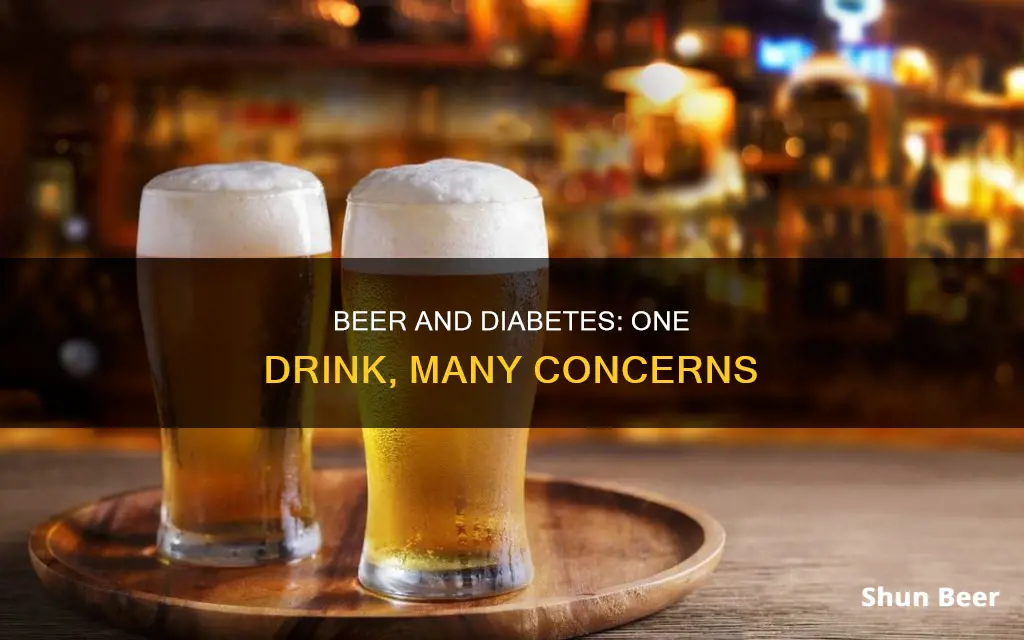
People with diabetes don't necessarily have to cut alcohol out of their diet. However, drinking can be more complicated for them. Alcohol can affect blood sugar levels and interact with diabetes medications, so it's important to know how to drink safely. Generally, drinking in moderation and monitoring blood sugar levels are recommended for diabetics.
| Characteristics | Values |
|---|---|
| Is beer off-limits for diabetics? | No, diabetics can drink beer. |
| How much beer can a diabetic drink? | One 12-ounce beer per day for women, two for men. |
| What are the risks of drinking beer for diabetics? | Hypoglycemia, weight gain, raised blood pressure, neuropathy, dehydration, sleep disturbances, cancer, heart disease. |
| What precautions should diabetics take before drinking beer? | Eat beforehand, monitor blood sugar, avoid drinking on an empty stomach, stay hydrated, carry hypo treatments and medical ID |
| What are some low-carb beer options? | Miller Lite, Coors Light, Bud Lite, Busch beers. |
What You'll Learn
- Drinking alcohol can cause hypoglycemia, or low blood sugar
- Alcohol can slow down carb metabolism, potentially leading to low blood sugar
- Drinking on an empty stomach can increase the risk of hypoglycemia
- Alcohol can affect blood sugar levels and interact with diabetes medications
- Beer is a significant source of carbohydrates and can impact blood sugar

Drinking alcohol can cause hypoglycemia, or low blood sugar
The risk of hypoglycemia is higher if you drink on an empty stomach or when your blood sugar levels are already low. Alcohol can also affect the liver for several hours after consumption, so it's important to monitor your blood sugar levels while drinking and up to 24 hours after you stop drinking. If you take insulin or medications like sulfonylureas that increase insulin production, drinking alcohol may lead to dangerously low blood sugar.
Symptoms of hypoglycemia include dizziness, lightheadedness, and loss of consciousness in more extreme cases. These symptoms can be similar to those of intoxication, so it can be difficult to tell if someone is experiencing hypoglycemia or is drunk. If you have diabetes and choose to drink alcohol, it's important to monitor your blood sugar levels, drink in moderation, and eat food while drinking to help prevent hypoglycemia.
To treat hypoglycemia, it is recommended to follow the "15-15 rule". This involves ingesting 15 grams of carbohydrates and then rechecking blood sugar levels after 15 minutes. If blood sugar levels are still below normal, continue to ingest 15 grams of carbohydrates every 15 minutes until target levels are achieved. Once blood sugar levels are in a safe range, eat a snack or meal to prevent them from dropping again.
In summary, drinking alcohol can cause hypoglycemia, especially in people with diabetes, by interfering with the liver's ability to regulate blood sugar levels. It is important to be aware of the risks and take precautions when consuming alcohol to help prevent and treat hypoglycemia.
Gluten Allergy and Beer: Is It Safe to Drink?
You may want to see also

Alcohol can slow down carb metabolism, potentially leading to low blood sugar
Alcohol can affect the liver's ability to regulate blood sugar levels. The liver is responsible for detoxifying the body by breaking down toxins like alcohol, as well as stabilising glucose levels by storing and releasing carbohydrates into the bloodstream. When you consume alcohol, the liver prioritises breaking it down over maintaining blood glucose levels, which can lead to hypoglycaemia (low blood sugar). This is more likely to occur if you drink on an empty stomach or when your blood sugar levels are already low.
The liver's choice to metabolise alcohol over carbohydrates can be dangerous for people with diabetes, especially if they are taking insulin or medications like sulfonylureas that increase insulin production. Insulin lowers blood sugar levels, so when the liver produces less glucose, medications that increase insulin can cause blood sugar levels to drop too low. This is why it is important for people with diabetes to monitor their blood sugar levels while drinking and to be aware of the symptoms of hypoglycaemia, which can include dizziness, drowsiness, confusion, difficulty walking, and loss of consciousness.
To prevent hypoglycaemia, it is recommended that you do not drink on an empty stomach and that you have food while you are drinking. It is also important to pace yourself and drink in moderation, staying within the recommended limits of no more than one drink per day for women and up to two drinks per day for men. Additionally, drinking water along with beer can help you stay hydrated.
It is worth noting that the impact of alcohol on blood sugar levels can vary depending on whether a person has eaten recently. In the fasting state, alcohol consumption can induce a significant reduction in blood glucose levels, leading to hypoglycaemia. On the other hand, in the fed state, single episodes of alcohol consumption may not lead to clinically significant changes in blood sugar levels and might even have a beneficial effect by slightly lowering blood sugar.
Drinking Beer and Driving: What's the Legal Limit?
You may want to see also

Drinking on an empty stomach can increase the risk of hypoglycemia
The liver is the body's detoxification centre, breaking down toxins like alcohol so that the kidneys can flush them away. However, it is not great at multitasking. When you drink on an empty stomach, the liver will choose to metabolise alcohol first, which can cause a delay in releasing necessary sugars into the bloodstream. This can lead to hypoglycemia, or low blood sugar.
The symptoms of hypoglycemia can include shakiness, dizziness, and fainting. These symptoms can be similar to those of alcohol intoxication, such as slurred speech, drowsiness, confusion, and difficulty walking. This can make it difficult to tell the two conditions apart, especially if you have hypoglycemia unawareness, where you don't recognise that your blood sugar is low.
To prevent hypoglycemia when drinking, it is important to eat food beforehand or while drinking. Food slows down the rate at which alcohol is absorbed into the bloodstream and provides better protection against low blood sugar than high-carb drinks. It is also important to monitor your blood sugar levels and stay within the recommended alcohol intake guidelines.
Bottom-Fill Beer: How Does It Work?
You may want to see also

Alcohol can affect blood sugar levels and interact with diabetes medications
Additionally, alcohol can affect the metabolism of carbohydrates, which are quickly absorbed by the body and can lead to a rapid spike in blood sugar levels. Liquid sugars, such as those found in sugary drinks, are quickly absorbed and can cause a quick spike in blood sugar. On the other hand, food is digested more gradually, providing better protection against low blood sugar levels. Therefore, it is important for diabetics to consume alcohol with food to help stabilise blood sugar levels.
Drinking alcohol can also increase the risk of hypoglycemia, especially when combined with diabetes medications such as insulin and sulfonylureas. This is because these medications can lower blood sugar levels, and alcohol can enhance this effect. Hypoglycemia can occur several hours after drinking, and the risk is higher for those who engage in exercise. It is important for diabetics to monitor their blood sugar levels regularly, especially before, during, and after drinking alcohol.
Furthermore, alcohol can affect weight management for diabetics. Alcoholic drinks can contain a lot of calories, which can contribute to weight gain over time. Therefore, diabetics who are trying to lose weight may need to reduce their alcohol consumption. Additionally, drinking alcohol can make it more challenging to count carbohydrates, as the amount of insulin required to cover the carbohydrates in alcoholic drinks may vary depending on the drink and other factors such as physical activity.
Drinking Beer in Phoenix Parks: What's Allowed?
You may want to see also

Beer is a significant source of carbohydrates and can impact blood sugar
The impact of beer on blood sugar is particularly relevant for individuals with diabetes, who need to carefully manage their blood sugar levels. For people with diabetes, drinking beer can lead to both hyperglycemia (high blood sugar) and hypoglycemia (low blood sugar). Hyperglycemia occurs when there is too much sugar in the bloodstream, which can damage organs and body tissues. On the other hand, hypoglycemia can cause symptoms such as dizziness, lightheadedness, and even loss of consciousness in more extreme cases.
The liver plays a crucial role in regulating blood sugar levels. It stabilizes glucose levels by storing carbohydrates and releasing them into the bloodstream as needed. However, when alcohol is present in the body, the liver prioritizes clearing it from the system, which can delay the release of necessary sugars into the bloodstream. This is why drinking alcohol can lead to hypoglycemia, especially if consumed on an empty stomach.
To avoid hypoglycemia, it is recommended to drink in moderation and monitor blood sugar levels regularly before, during, and even up to 24 hours after drinking. Eating food while drinking and staying hydrated by drinking water are also important measures to prevent hypoglycemia. Additionally, it is advised to be aware of the symptoms of hypoglycemia, as they can be similar to those of being drunk, such as slurred speech, drowsiness, and confusion.
When it comes to choosing a beer, "light" beers are recommended as they typically contain fewer carbohydrates and lower alcohol content. For example, light beers usually have 5 or fewer grams of carbohydrates per serving, while craft beers like IPAs and stouts can have 15 grams or more. Therefore, selecting a light beer and limiting consumption to one serving can help minimize the impact on blood sugar levels.
Beer and Sudafed: What You Should Know
You may want to see also
Frequently asked questions
Yes, a person with diabetes can drink beer, but it is important to do so safely and in moderation. Beer can impact blood sugar levels and contribute to weight gain, so drinking in moderation and monitoring blood sugar levels are important.
Beer is a significant source of carbohydrates, which can impact blood sugar. Alcohol also interferes with the liver's ability to release glucose into the bloodstream, which can lead to low blood sugar (hypoglycemia).
Yes, drinking beer can increase the risk of hypoglycemia, especially when combined with diabetes medications such as insulin. It is important to be mindful of alcohol consumption and monitor blood sugar levels regularly.
Low-carb beers are generally recommended for people with diabetes. Some popular options include Miller Lite, Coors Light, Bud Lite, and Busch beers, which have fewer carbohydrates and calories than regular beers.







